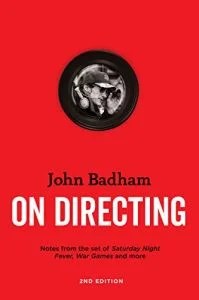John Badham On Directing: 2nd Edition (book review).
I did raise an eyebrow at being asked to review a second edition of ‘John Badham On Directing’. I mean, what else did he have to say but was assured there was a new section that needed to be looked at. This time, it’s the fourth section dealing with episodic TV. Even so, looking at the list of people he gets quotes from to embellish his text, I’m happy to read and see if there are any more nuggets here. After all, where you have an opening piece about the dividing wall between directors and actors not getting on in your profession, understanding the problem might at least find some sort of resolution.
A lot of what Badham has to say about getting to know actors and prepping with them at the beginning of the day’s work makes a lot of sense, more so if there’s a lack of rehearsal time. Saying that, producers really need to read this book and appreciate that rehearsal time saves money in filming time as it resolves all manner of problems.
For novice directors on their first film, Badham points out the mistakes made and how to avoid them and not letting ego get in the way. I did have a ponder on this because most upcoming directors rise up from second-unit as well as being allowed to watch or ghost a film being made by a real director yet so many appear to make the same mistake.
The chapter on passing notes from directors to actors did make me think that the name is a bit of a misnomer in that it boils down to a quiet private chat as to what is needed for a particular scene and seen how it is translated on film. A lot of it is having respect to people, whether they are performers or crew and make it a two-way affair in the creative process. Even so, you would think the crew and even other cast members must wonder, based on the actor’s reaction, what was said in private before carrying on and whether they are going to get the same treatment.
I should point out that there are a lot of first-hand anecdotes of what happens behind the scenes and a lot of book examples to look up and I found myself noting some of these myself and there is a complete bibliography at the back of the book. The real test for actors is getting them out of their comfort zones and I would have loved to have seen some comparison between how Americans and British actors differ in this. The British are far more likely to bluff and get on with it on the day.
Something that is telling about not over-whelming actors or anyone with too many points at one go because they won’t remember more than the first couple. I do find myself thinking of applying a lot of this information in other walks of life and wondered perhaps I gave too much info when I was going through novel samples although I do remember adding get better at each of them one at a time. It does get a bit unstuck when the recipient thinks that’s the only problem not just the tip. One can only hope in acting that actors might see the problem to be learnt from for other directors as well.
With Chapter 8, it does become apparent that a lot of the structuring applies to all manner of storytelling. If you have a boring scene then you need to work on it so it doesn’t become boring. A stumbling block for all writers, especially novices, is the reason they don’t complete a story is they find themselves losing interest in what they are writing. If it happens to the writer, how can they expect a reader to do better? With directors, they do more takes, polishing areas where they see flaws. For storywriters, they need to look at how people react and carry the emotional responses that a reader can recognise. There’s more than that but if you thought books such as these can’t help you improve your writing skills then you aren’t studying storycraft enough as it embraces all areas.
Moving onto directing on TV, as this book is targeted at the American audience, Badham gives a brief history for development of TV channels over there, dependent on advertising for its money and nice programmes so as not to deter people buying their products. When you have that versus the film industry, it does become more obvious why film actors looked down on television actors. Of course, that changed later in their careers why many stars went to TV for work as younger actors replaced them. Oddly, the one thing I would have liked to have heard his thoughts on was how do directors become executive producers or showrunners as in the American market these mostly come from being writers.
In many respects, the main difference between film and TV is speed and you have to get a move on with the latter and appease your producers and get the product out there. A director needs to be able to be multi-task and understand what everyone else is doing and listen to what they have to say.
As you should be able to tell from the length of this review, I’ve learnt a lot that I can apply elsewhere. Badham writes a lot of sense and from experience, showing his own failures and learning from them himself. If you have plans to direct, even if its only as an amateur, there is much to learn. There is also a lot about management skill and communicating with people so there really is something here for everyone.
GF Willmetts
September 2020
(pub: Michael Wiese Productions, 2020. 275 indexed small enlarged paperback. Price: $28.34 (US), £22.79 (UK). ISBN: 978-1-61593-316-7)
check out website: www.mwp.com

